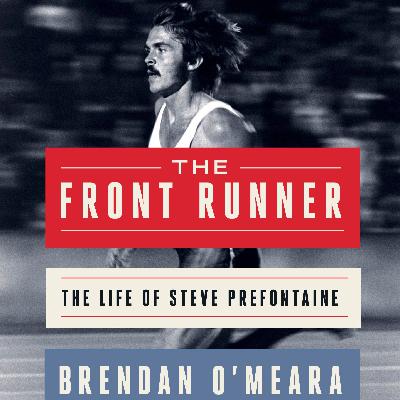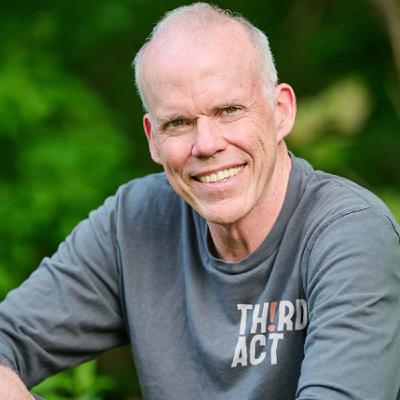Discover The Creative Nonfiction Podcast with Brendan O'Meara
The Creative Nonfiction Podcast with Brendan O'Meara

The Creative Nonfiction Podcast with Brendan O'Meara
Author: Brendan O'Meara
Subscribed: 199Played: 6,424Subscribe
Share
© Brendan O'Meara
Description
The Creative Nonfiction Podcast with Brendan O'Meara is a weekly podcast that showcases leaders in narrative journalism, essay, memoir, documentary film, radio and podcasts about the art and craft of telling true stories. Follow the show @creativenonfictionpodcast on Instagram and visit patreon.com/cnfpod to support!
520 Episodes
Reverse
"You start to wonder was it all worth it? Or what's the point in trying to do it again? You know, if there's going to be more disappointment in the future. I think it is something that you know probably just changes as you go on, regardless, right? I want to get that second book under my belt so it's not all just on this one, this one baby, you know?" says Maggie Mertens.
Maggie is the author of Better, Faster, Farther: How Running Changed Everything We Know About Women (Algonquin Books). It's a brilliant book that traces the advancement of women's athletics through running. Hard as it is to believe, but it was thought that women couldn't, nay, shouldn't run farther than 800 meters. Running might affect their fragile constitution, they might even ruin the work place … there's a name for headlines like that one: They're called subscription cancellers. [Context: The New York Times ran a podcast headline with its conservative columnist asking "Did Women Ruin the Workplace?" Anyhoo …
Maggie is making the freelance workplace a good time, thank you very much, and it's a pleasure to get to celebrate her approach to the work and her incredible book that came out in 2024.
So Maggie's work has appeared in the Wall Street Journal, The Atlantic, NPR, Sports Illustrated, ESPNw, Creative Nonfiction, among others. She has a Substack called My So Called Feminist Life at maggiemertens.substack.com [http://maggiemertens.substack.com/] and she does much of social media-ing on IG @maggiejmertens and you can learn more about her and her work at maggiemertens.com [http://maggiemertens.com/].
So Maggie and I talk about:
* The long book writing process
* Community
* Time pegs
* Strict deadlines for the self
* How she named her chapters in Better Faster Farther
* Taking the wins
* And the post-book malaise
Order The Front Runner [https://www.harpercollins.com/products/the-front-runner-brendan-omeara?variant=43044900962338]
Newsletter: Rage Against the Algorithm [https://rageagainstthealgorithm.beehiiv.com/]
Welcome to Pitch Club [https://welcometopitchclub.substack.com/]
Show notes: brendanomeara.com [http://brendanomeara.com/]
"I have this desire to write as a novelist might write but write nonfiction," says Sasha Bonét, the author of The Waterbearers: A Memoir of Mothers and Daughters (Knopf).
Today we have the brilliant writer, the brilliant mind, Sasha Bonét, author of The Waterbearers: A Memoir of Mothers and Daughters. This book is a masterpiece that chronicles the matriarchal lineage of Sasha's family, and the pain, and the struggle, and the triumph of will, of the slow, methodical, generational march forward and the residue of generational trauma, what we can outrun and we can never outrun. Damn, man, it's something of a family epic that brought to mind A Hundred Years of Solitude to me in its scope, in its sweep. I don't know. Maybe I have no clue what I'm talking about.
Sasha is a writer, critic, and editor living in the socialist hellscape of New York City, woot, woot!
Her essays have appeared in the Paris Review, Aperture, New York Magazine, Vogue, and BOMB, among others. She earned an MFA from Columbia University and teaches nonfiction writing at Columbia's School of the Arts and Barnard College. You can learn more about Sasha at sashabonet.com [http://sashabonet.com/] and follow her on the gram @sasha.bonet.
This is a rich conversation about:
* Community
* The in-between place
* Not holding back
* Her influences
* Her writing practice
* And how jazz informs her writing
She's also good friends with G'Ra Asim, who appeared on these podcast airwaves way back on Ep. 256.
Order The Front Runner [https://www.harpercollins.com/products/the-front-runner-brendan-omeara?variant=43044900962338]
Newsletter: Rage Against the Algorithm [https://rageagainstthealgorithm.beehiiv.com/]
Welcome to Pitch Club [https://welcometopitchclub.substack.com/]
Show notes: brendanomeara.com [http://brendanomeara.com/]
"I kinda hate it when people say writing is fun," says Jack Rodolico, author The Atavist original "The Blue Book Burglar."
Today we feature Jack Rodolico, who is a bit of an audio maven, but he comes to us hot off the Atavist presses to talk about "The Blue Book Burglar: The Social Register was a who's who of America's rich and powerful— the heirs of robber barons, scions of political dynasties, and descendants of Mayflower passengers. It was also the perfect hit list for the country's hardest-working art thief."
It's a fun, rollicking read, not too heavy, not really heavy at all, merely a great caper.
Batting leadoff is lead editor Jonah Ogles, so we talk about his side of the table about what less experienced writers can learn about pitching the Atavist and how Jonah worked with Jack to fix the structure of the piece. As always, really rich stuff from the editing side of things.
A bit more about Jack Rodolico, the dude's got it going on … His work has appeared in The Boston Globe, NPR, 99% Invisible, and NHPR … He's earning an MFA in fiction, and that's really helping him with his nonfiction writing, as you'll hear in a moment.
You can learn more about Jack at his website journalistjack.com [http://journalistjack.com/]. In this conversation we talk about his Atavist piece, writing fiction, earning trust, why you can't pay sources for information, how he organizes his research and cites his work, beginnings and endings, and how he didn't necessarily want to be a journalist, rather he wanted to be a writer.
Order The Front Runner [https://www.harpercollins.com/products/the-front-runner-brendan-omeara?variant=43044900962338]
Newsletter: Rage Against the Algorithm [https://rageagainstthealgorithm.beehiiv.com/]
Welcome to Pitch Club [https://welcometopitchclub.substack.com/]
Show notes: brendanomeara.com [http://brendanomeara.com/]
"So much misery. It is so much misery. It is so hard. It's not natural, locking yourself in your room for three years to focus on one person is not mentally healthy. Leigh Montville, great, great writer, said to me years ago, he's like, 'It's an unnatural thing. You spend two years in a hole to come out for two weeks, you know?'" — Jeff Pearlman, author of Only God Can Judge Me.
Today we have Jeff Pearlman returning to the show to talk about his 11th book, his latest book, Only God Can Judge Me: The Many Lives of Tupac Shakur (Mariner Books). Jeff has made a career out of being a sports writer, so when I heard he had turned his biographical eye toward a hiphop icon from the 1990s, I was especially intrigued by how he would approach it. It's the kind of book he could pursue after having proved himself ten times before, with a few of his books becoming coveted NYT bestsellers. He interviewed close to 700 people for the book … that's how you do this. THAT is how it's done.
The first time he was on, I think I annoyed him a bit with my questions on "craft." He kind of bristled at the idea that it was a "craft," which maybe he thought was too cute a word to put on it. To him, it's fucking work. You make all the calls. Then you make more. You go to the locations. You knock on doors. You report, report, report. It has more to do with tenacity and rigor than art … so I made sure I steered clear of things that felt too crafty this time around.
Jeff is all over the place. By that I mean he's got a YouTube presence with The Press Box Chronicles, a TikTok presence with more than 300,000 followers. He has a podcast, Two Writers Slinging Yang (still waiting for my invite), a political Substack called The Truth OC, and his writing/journalism Substack The Yang Yang. He's a writer in his 50s and he's tremendously nimble. He understands, even with his platform and profile, that nobody is going to champion your book like you can. Honestly, we can all take a page out of his book and how he has embraced the ever-changing playbook for book promotion.
In this conversation Jeff and I talk about:
* Book promotion
* Finding the little guys
* How he handled another Tupac biography publishing during his research for this book
* The misery of it all
* Conversations he had with Jonathan Eig, the PP winning author of King: A Life
* Jeff's favorite "version" of Tupac
* And hitting the "fuck-it" stage.
All great stuff, as you might come to expect from speaking to Jeff Pearlman. His audio was a bit muddy. It's not as great as I would have liked but I think the message carries the day.
Order The Front Runner [https://www.harpercollins.com/products/the-front-runner-brendan-omeara?variant=43044900962338]
Newsletter: Rage Against the Algorithm [https://rageagainstthealgorithm.beehiiv.com/]
Welcome to Pitch Club [https://welcometopitchclub.substack.com/]
Show notes: brendanomeara.com [http://brendanomeara.com/]
"When I came in [to Longreads], I didn't come in and say, I think we need to grow aggressively. I said, 'Let's figure out who we are. Let's figure out what other people aren't doing, that we do , and that we can do better.' And so the only real thing that changed when I first came in was to try to make the editors known quantities," says Peter Rubin, head of publishing at Automattic, where he works primarily with Longreads, but also The Atavist Magazine.
Today we have Peter Rubin. He's on the pod to talk about a lot of things, but he's also drumming up attention for a membership drive for longreads.com [http://longreads.com/], a hub of curation for the best longreads on the web, first started by Mark Armstrong. Longreads has since gone onto publish original works of criticism, journalism, and personal essays and won a National Magazine Award for best digital illustration in 2020. In conjunction with with Oregon Public Broadcasting, they produced Bundyville, the hit podcast that made Leah Sottile something of a household name (shoutout to her new season of Hush).
He spent many years at Wired Magazine and he's also the author of Future Presence: How Virtual Reality is Changing Human Connection, Intimacy, and the Limits of Ordinary Life, which came out in 2018, but with Chat GPT going full porn for verified adult users (what could possibly go wrong?), Peter's book seems oddly of the moment … also it's only seven years old, but I guess in tech that's like the stone age.
You can learn more about Peter from his very stripped down website ptrrbn.com [http://ptrrbn.com/], yeah, he hates vowels, don't come at him with vowels, or on the gram @provenself.
In this conversation we talk about:
* Finding diamonds in the rough
* How he cultivated his editor eye
* Being merciless in the edit
* Figuring out the new identity of Longreads when he took over in 2021
* Curation
* And the Longreads membership drive
Visit longreads.com [http://longreads.com/] to read more and to pony up … that's what I'm going to do, for you people who think I get handouts, just know that I'm not that savvy.
Order The Front Runner [https://www.harpercollins.com/products/the-front-runner-brendan-omeara?variant=43044900962338]
Newsletter: Rage Against the Algorithm [https://rageagainstthealgorithm.beehiiv.com/]
Welcome to Pitch Club [https://welcometopitchclub.substack.com/]
Show notes: brendanomeara.com [http://brendanomeara.com/]
"As a reader, if I were a fan reading this book, I want the good, the bad and the ugly. I want you to rip the band aid off and tell the truth. Because, from my from my experience, I've read a lot of memoirs that are super boring and just fluff," says Jeremy X. Wagner, co-author of Curtis Duffy's Fireproof: Memoir of a Chef (Dead Sky Publishing).
We have Jeremy X. Wagner on the show today. This dude is a stone-cold badass and the co-author/ghost writer of Fireproof: Memoir of a Chef (Dead Sky Publishing). Jeremy, man, he's a heavy metal musician and founder of the death metal band Broken Hope.
He's the author of the novels Rabid Heart, which was nominated for the best horror novel at the 2019 Splatterpunk Awards, and the novel The Armageddon Chord. He has a new novel coming out in January titled Wretch, so stay clued into jeremyxwagner.com [http://jeremyxwagner.com/] for more info on that.
He's the CEO of the TV/film company Aphotic Media and the indie publishing company Dead Sky Publishing. He has a very varied creative life which I find inspiring and really fucking cool.
In this conversation we talk about:
* How he became an accidental publisher
* Playing guitar
* Being turned on to Ride the Lightning
* Passion and imagination as a driver
* Learning the business inside and out
* Competition
* Trust
* And how he translated Curtis's voice onto the page
Order The Front Runner [https://www.harpercollins.com/products/the-front-runner-brendan-omeara?variant=43044900962338]
Newsletter: Rage Against the Algorithm [https://rageagainstthealgorithm.beehiiv.com/]
Welcome to Pitch Club [https://welcometopitchclub.substack.com/]
Show notes: brendanomeara.com [http://brendanomeara.com/]
"This has to be meaningful to you. It has to be a story that won't leave you alone, a story that you're willing to rearrange your calendar for," says Masha Hamilton, whose Atavist Magazine story is titled "I've Gone to Look for America."
Today we have Masha Hamilton, a journalist, a novelist, a fan of the show, a fan of Pitch Club. You'll want to visit mashahamilton.com [http://mashahamilton.com/] to learn more about her wide-ranging career covering the world. She's the author of five novels and trying to sell her sixth. She was at one point the director of communications and public diplomacy at the US embassy in Kabul.
Her story for the Atavist is about her driving the entire length of I-95 with her photographer son Cheney, and stopping at just about every rest stop to speak with strangers about how they feel about our country. "Conversations and revelations about an ailing nation along Interstate 95." Man, those Atavist editors sure can write the hell out of a dek.
Guess who's back!? Seyward Darby! Do your best Kermit the Frog dance. Very nice to hear her and this piece challenged Seyward in ways I didn't see coming: Meaning, she didn't share Masha's optimism or hope. Seyward, for lack of a better word, disagreed with it, so there was an interesting tension she brought to the edit.
For Masha's part, we talk about:
* Novels as complimentary to her nonfiction
* Covering societies in change
* Healing through story
* How this was piece was a therapy session
* Accelerated intimacy
* Endings
* Middles
* Finding the meaning
* Writing you rearrange your calendar for
* And belonging as practice
Order The Front Runner [https://www.harpercollins.com/products/the-front-runner-brendan-omeara?variant=43044900962338]
Newsletter: Rage Against the Algorithm [https://rageagainstthealgorithm.beehiiv.com/]
Welcome to Pitch Club [https://welcometopitchclub.substack.com/]
Show notes: brendanomeara.com [http://brendanomeara.com/]
"My editor was like, hold on, you need to put your thumb on the scale of why this matters. Now, there's no first person in this, but you have your thumb on the scale, you need to assert your own point of view. Like, this matters, why? says Brendan O'Meara, author of The Front Runner: The Life of Steve Prefontaine Mariner Books.
Who the heck does this host think he is being a guest on his own podcast? The nerve of this guy. That's right, for the third live taping of the Creative Nonfiction Podcast at Gratitude Brewing, I was interviewed by the brilliant Daniel Littlewood, who kinda makes me look and sound like a jabroni's jabroni.
Daniel is Group Creative Director at The Explainer Studio at Vox Media, Inc. He edited the documentary feature film "Don't Think I've Forgotten: Cambodia's Lost Rock & Roll." Formerly, he was the lead producer for HuffPost's Live's multi-million dollar sponsored content division. He has a tremendously easy-going, conversation nature to interviewing with tremendous shot-clock awareness that required next to no editing on my part.
So The Front Runner has, at this point, been out for four months. Daniel and I recorded this on July 27 so the book was only out for two months at that time. This was a painful edit for me because I'm so sick of hearing myself talk and talk and talk. I'm not so sure I took a single breath during this conversation, but Daniel was an incredible partner and if something should happen to me, I want Daniel to take over CNF Pod.
In this episode, I talk about:
* My love of my editor
* Valorization of pain
* Making the case for why I was the person to write this book
* Asserting POV in biography
* World building
* And why it was a good thing I forgot the combination of our gun safe
Ruby McConnell introduces us at Gratitude Brewing.
Order The Front Runner [https://www.harpercollins.com/products/the-front-runner-brendan-omeara?variant=43044900962338]
Newsletter: Rage Against the Algorithm [https://rageagainstthealgorithm.beehiiv.com/]
Welcome to Pitch Club [https://welcometopitchclub.substack.com/]
Show notes: brendanomeara.com [http://brendanomeara.com/]
"Writing a book is so overwhelming. I need to have a book that's like so many steps in between. So what I do to manage my own anxiety and overwhelm about that is I'm really, really obsessed with breaking everything into little steps so that all I need to do is the next step and then I don't get overwhelmed," says Tracy Slater, author of Together in Manzanar.
It's another Super Size Me CNFin' Double Feature, Ep. 491 with Tracy Slater. She is the author of Together in Manzanar: The True Story of a Japanese Jewish Family in an American Concentration Camp. It's published by Chicago Review Press.
As Tracy and I talk about in this podcast, this book is sadly of the moment. It happened 80-some years ago, this vile incarceration of Japanese immigrants and Japanese AMERICANS, 2/3rds of them were American citizens, rounded up and shipped to American concentration camps. Disgusting and disgraceful, but these are the histories we need to look dead in the eye, these are the histories THIS administration aims to erase so it's the work of historians, and journalists, and storytellers like Tracy to keep these stories alive.
She's an American writer from Boston living for a bit in Toronto. Her essays and articles have been published in the New York Times, Wall Street Journal, The Boston Globe, Lit Hub, among other places. She's also the author of the memoir The Good Shufu. In this conversation we talk about:
* How she broke up with her first agent
* How sadly of the moment Together in Manzanar is
* Being a white person writing this story and worrying of blind spots
* How she handled the overwhelm of it all
* And how the story chooses her
She also thanked me and the podcast in her acknowledgements, which is really sweet and made me feel good. As you know, CNFers, this podcast often feels pretty uni-directional, so to know it's "working," that it's of use and helpful, that's validating. You can learn more about tracy at tracyslater.com [http://tracyslater.com/] and follow her on Bluesky at tracyslater.bsky.social or on IG at at good_shufu. I don't know about you, but I'm ready for this.
Order The Front Runner [https://www.harpercollins.com/products/the-front-runner-brendan-omeara?variant=43044900962338]
Newsletter: Rage Against the Algorithm [https://rageagainstthealgorithm.beehiiv.com/]
Welcome to Pitch Club [https://welcometopitchclub.substack.com/]
Show notes: brendanomeara.com [http://brendanomeara.com/]
"When I got back to [writing], it was like an athlete or a martial artist coming back to the practice, and the endorphins start running back. And you remember the joy that you had in it, also the struggles of it, but you're back in it, and then I couldn't be stopped," says Jeff Chang, author of Water, Mirror, Echo.
Today we have Jeff Chang, and what a great conversation this was. He's the author of the beefy biography Water, Mirror, Echo: Bruce Lee and the Making of Asian America. It's published by Mariner Books, so we share a publisher here. Pretty cool.
He's also the author of Can't Stop, Won't Stop: A History of the Hip-Hop Generation, which was the winner of the American Book Award, Who We Be: A Cultural History of Race in Post-Civil Rights America, and We Gon' Be Alright: Notes on Race and Resegregation.
He's a writer, host, and cultural organizer known for his work in culture, politics, the arts, and music. His work has appeared in the New York Times, Wall Street Journal, The Guardian, Los Angeles Times, and the Believer, among many others. He has a great Substack at zentronix.substack.com [http://zentronix.substack.com/] and you can follow him on Instagram @zentronix. You can learn more about Jeff at jeffchang.net [http://jeffchang.net/].
We talk about:
* How hip-hop influenced his work
* Trust and relationships
* Voice
* Compression
* And stealing time to write
Why don't you settle in?
Order The Front Runner [https://www.harpercollins.com/products/the-front-runner-brendan-omeara?variant=43044900962338]
Newsletter: Rage Against the Algorithm [https://rageagainstthealgorithm.beehiiv.com/]
Welcome to Pitch Club [https://welcometopitchclub.substack.com/]
Show notes: brendanomeara.com [http://brendanomeara.com/]
"For many of us, myself included, it's easy to want to be on the New York Times bestseller list, or the USA Today bestseller list, and to try to get an amazing number of week-one sales, but it's important to remember that those lists are really hard to get on, and there can be this nice long tail in terms of the impact of a book where maybe it doesn't necessarily get a ton of sales in that first week or that first month. But over time, it continues to sell, right? And then you get these bumps, and you realize that, oh, this book has staying power," says Mallary Tenore Tarpley.
Mallary is here today for a double-feature Friday. She's the author of Slip: Life in the Middle of Eating Disorder Recovery (Simon & Schuster/Simon Element). It's pretty heavy shit, man. She developed a disordered relationship to food when her mother passed away when she was just 11 years old. Mallary spent years in treatment and the book blends her personal story with the ballast of science and outward-facing reporting, memoir-plus as it was pitched. We'll call it Memoir Max.
Mallary has been on the hustle for Slip. She's everywhere. She's posting. She's newslettering. She's beating the drum. She's an example of what a modern author must do in this age. I'd say take a look at what she's doing and maybe cherry pick what works for you. But speaking from experience, really nobody is going to do it for you.
She graduated from Providence College and earned an MFA in creative nonfiction from Goucher College, where she started Slip. She worked with my dear friend Maggie Messitt on it for a bit.
Mallary is an assistant professor of practice at the University of Texas where she teaches journalism classes. She started her career at The Poynter Institute where she would become the managing editor of the website, poynter.org [http://poynter.org/]. Her work has appeared in The New York Times, The Washington Post, Teen Vogue, Nieman Storyboard and she has a Substack, don't we all, called Write at the Edge, at mallary.substack.com [http://mallary.substack.com/]. You can also learn more about her at mallarytenoretarpley.com [http://mallarytenoretarpley.com/] and follow her on LinkedIn or Instagram as well.
We talk a lot about
* Platform and publicity
* How she vetted a freelance publicist
* Staying power
* And some of her best memories working alongside Roy Peter Clark at Poynter
Order The Front Runner [https://www.harpercollins.com/products/the-front-runner-brendan-omeara?variant=43044900962338]
Newsletter: Rage Against the Algorithm [https://rageagainstthealgorithm.beehiiv.com/]
Welcome to Pitch Club [https://welcometopitchclub.substack.com/]
Show notes: brendanomeara.com [http://brendanomeara.com/]
"The point of my book and the point of this big day of action that we're doing across the country is to drive that notion away that this isn't alternative energy, that it's the obvious, straightforward, common sense and very beautiful way to power the world going forward. To use the analogy I've been using, it's not any longer the Whole Foods of energy: nice, but pricey. It is now the Costco of energy: cheap available in bulk on the shelf, ready to go," says Bill McKibben, author of Here Comes the Sun.
Today we have Bill McKibben, author, at last count, of 447 books, including his latest Here Comes the Sun: A Last Chance for the Climate and a Fresh Chance for Civilization. It's published by Norton and if ever there was an American president open to the idea of non-fossil-fuel energy solutions, it's this one.
Photosynthesize, baby, photosynthesize, just rolls off the tongue.
So if you're a real drip and don't know who Bill McKibben is, let me tell you a thing or two: He's the author 19 books, including his pioneering book on climate called The End of Nature, and one of my favorite books on rethinking consumerism, Hundred Dollar Holiday. Aside from being a journalist basically his entire life, he's an activist who helped found 350.org [http://350.org/], and Third Act, which is a movement of Americans over 60 who bring their collective power to the climate and democracy fights. We call them silver-haired ponytails here in Eugene.
And his latest venture is SunDay, a creative climate project that celebrates solar energy through art, storytelling, and public engagement. The day of action is Sunday, September 21, whereby they'll celebrate solar, host e-bike parades, give heat pump tours, and rally for change. There's a SunDay event in Eugene, but I'll unfortunately be burning fossil fuels that day driving up to Portland for a book event. But visit sunday.earth to find a local event near you. Those solar panel subsidies are going bye bye since the wannabe fuhrer will be gutting anything that doesn't belch CO2 into the air.
Bill also writes the incredibly popular Substack The Crucial Years, which has nearly 100,000 subscribers. You can learn more about Bill and his books at billmckibben.com [http://billmckibben.com/], and you're about to learn more about how he told William Shawn to fuck off, his start as a sports writer, being a pioneer writing about climate, and how he wrote Here Comes the Sun in about one month.
Order The Front Runner [https://www.harpercollins.com/products/the-front-runner-brendan-omeara?variant=43044900962338]
Newsletter: Rage Against the Algorithm [https://rageagainstthealgorithm.beehiiv.com/]
Welcome to Pitch Club [https://welcometopitchclub.substack.com/]
Show notes: brendanomeara.com [http://brendanomeara.com/]
Robert Weintraub is a best selling author and, most recently, wrote "American Hindenburg" for The Atavist Magazine..
We're going to hear from lead editor Jonah Ogles about his side of the table and how he advises people to model their stories after previously published ones and how there's never really a wasted moment by doing as much research as possible. Either you find out there's nothing there, or you find out there's there there and you have more grist for the mill.
Robert is the best selling author of No Better Friend, The Divine Miss Marble, The House that Ruth Built, and The Victory Season. He has a Substack called NYC 1000 where he counts down the top 1,000 sporting events in New York City. That's at weintraubr.substack.com [https://weintraubr.substack.com/?utm_campaign=profile_chips].
Robert cut his teeth as a television producer at ESPN, but soon began writing for Slate, The New York Times, The Guardian, Grantland, and now The Atavist.
We talk about creating these historical narratives and grounding the characters in their present, looking at a magazine and then thinking what kind of stories you can pitch there, and how his Atavist story started as a book proposal.
You can learn more about Robert at robertweintraubauthor.com.
Order The Front Runner [https://www.harpercollins.com/products/the-front-runner-brendan-omeara?variant=43044900962338]
Newsletter: Rage Against the Algorithm [https://rageagainstthealgorithm.beehiiv.com/]
Welcome to Pitch Club [https://welcometopitchclub.substack.com/]
Show notes: brendanomeara.com [http://brendanomeara.com/]
"I really love this medium. I think cartooning is an incredible medium. There aren't a lot of rules. You can, if you can, really make it up. You can make it suit you," says Roz Chast a cartoonist and artist whose work routinely appears in The New Yorker.
So today we have Roz Chast [https://rozchast.com/bio.shtml]. You know Roz Chast, and if you don't, quite frankly I hope we never meet. She's a long time cartoonist for The New Yorker whose work is kinda of panicky and bleak and goofy and … heightened … and wicked smaht. She's the author of Can't We Talk About Something More Pleasant?, Going into Town, and What I Hate from A to Z [https://rozchast.com/books.shtml]and what brought Roz to the podcast is a two 1,000-piece puzzles and a 2026 wall calendar now out by Workman Publishing. Really cool, and you can find those at hachettebookgroup.com [http://hachettebookgroup.com/].
Cool stuff.
Roz was, of course, a joy to speak with. I watched several interviews with her in preparation for this and I reached out to Dana Jeri Maier [https://brendanomeara.com/episode-480-dana-jeri-maier-doesnt-trust-anyone-with-a-neat-desk/]for questions because Dana loves Roz, and is a working cartoonist, so it seemed like a good shoulder to tap.
Roz is a true artist. She paints these pysanka eggs [https://rozchast.com/stuff.shtml], which are dyed eggs with cool paintings on them. She's into block printing now and she does some rug weaving things, too. I'm sure there's a formal term for it. She was inducted into the Society of Illustrators Hall of Fame in 2019. She won the National Book Critics' Circle award for Autobiography in 2014, and also was a National Book Award finalist for Can't We Talk About Something More Pleasant? Her work routinely appears in The New Yorker and in this episode we talk about:
* The ricketyness of a freelance career
* How being an outsider made her a better cartoonist
* How cartooning is like being at the children's table of art
* Aging parents
* And her experience on The Simpsons.
Lots of rich stuff here that I hope you enjoy. I know I did.
Order The Front Runner [https://www.harpercollins.com/products/the-front-runner-brendan-omeara?variant=43044900962338]
Newsletter: Rage Against the Algorithm [https://rageagainstthealgorithm.beehiiv.com/]
Welcome to Pitch Club [https://welcometopitchclub.substack.com/]
Show notes: brendanomeara.com [http://brendanomeara.com/]
"God, I feel like I'm still enduring that, like it's this sort of ongoing thing where I'm not sure I ever if I'll ever get to a place where I feel like my work and ambitions for the work and daydreams about writing and art-making ever meet my taste," says Patrycja Humienik.
For Ep. 485 we've got Patrycja Humienik. She's a poet and her debut collection is We Contain Landscapes and it is published by Tin House. Patrycja is the daughter of Polish immigrants and is a writer, editor, and teaching artist. You can follow her on the gram @jej_sen.
So Patrycja and I had nice little jam sesh about:
* Trusting the path
* The Magic of Revision
* Weekly Writing Rituals with her Work Wife
* Tension and Textures
* And writing without the pressure of publication
Some really rich stuff. Her work has appeared in the New Yorker, that rag, Gulf Coast, Poetry Society of America and many others. She works between borders: of disciplines, language, body, art activism, conflict/transformation. She's a true artist, man. You can learn more about her at www.patrycjasara.com [http://www.patrycjasara.com/].
Order The Front Runner [https://www.harpercollins.com/products/the-front-runner-brendan-omeara?variant=43044900962338]
Newsletter: Rage Against the Algorithm [https://rageagainstthealgorithm.beehiiv.com/]
Welcome to Pitch Club [https://welcometopitchclub.substack.com/]
Show notes: brendanomeara.com [http://brendanomeara.com/]
"I am tyrannical about noise and about quiet. I don't feel that I can control the amount of mess I make. I mean, I know I can, but I kind of can't. And there's just so many things about my character that are really detrimental to having a writing process, which I need, and it's just so opposed to everything that's going on in my disgustoid little spirit," says Rax King, author of Sloppy.
As I tell Rax in this conversation, I hadn't been reading a lot of what I'd call "fun" books. I wasn't having much by way of fun reading for a long time and that changed with Sloppy, which isn't to say the book doesn't have its heavy moments, but it's couched in a buoyant and irreverent voice that I found very appealing.
Like Melissa Febos, Rax is something of a quote machine with acerbic wit that made this episode really electric. That's something I notice from voice-heavy memoirists and essayists. Like, if you're not throwing heat as an essayist, you gotta work on your game. Maybe there are some who can lyric their way through, but that's not my taste, personally. I need people pointing out the absurdities and their complicity in the absurdity. I don't even know what that means, but it sounded good.
Rax King also is the author of Tacky: Love Letters to the Worst Culture We Have to Offer and the co-host of Low Culture Boil with Courtney Rawlings and Amber Rollo. Rax's work has been nominated for a James Beard Award and has appeared in Food & Wine, MEL Magazine, Glamour and Electric Literature. You can learn more about Rax at her website raxkingisdead.com [http://raxkingisdead.com/] or follow her on the gram @raxkingisdead.
We talk about revisions, her sobriety, her sloppiness, money issues, steady-income spouses and a lot of other stuff. She really brought the heat.
Order The Front Runner [https://www.harpercollins.com/products/the-front-runner-brendan-omeara?variant=43044900962338]
Newsletter: Rage Against the Algorithm [https://rageagainstthealgorithm.beehiiv.com/]
Welcome to Pitch Club [https://welcometopitchclub.substack.com/]
Show notes: brendanomeara.com [http://brendanomeara.com/]
"That is the main difference between storytelling for the ear and writing, is that the cost of revisions is so much higher," says Julia Barton.
We have Julia Barton. Julia was the third hire, I think I have that right, with Pushkin Industries, the podcast giant founded by Malcolm Gladwell. She was the executive editor of Pushkin and helped develop Revisionist History and Against the Rules, the latter by the journalist and uber best seller Michael Lewis. She, quite literary, edits with her ears. Now she consults on stories as part of her company RadioWright.
I met Julia briefly at the Power of Narrative Conference in Boston, where she's also a Nieman Fellow, as her talk followed mine. I did not attend her talk and I feel great shame about that, but my battery was in the negative after my talk and I just needed to disappear, the plight of the introvert. I could have learned a LOT since her talk was about the grammar of audio stories. I atoned by inviting her on the podcast to talk about her auditory journey.
So Julia has a cool newsletter called Continuous Wave, which is a weekly newsletter exploring the forgotten history of broadcast and all electronic media. It's very specific, which is what you want from a newsletter. She's the founder of RadioWright, she is @bartona104 on IG.
We talk about:
* Editing audio stories and how it's different than print
* What's the ideal length for a podcast be it narrative or interview
* The cost of revisions
* Scratch mixes and dry mixes
* Animal vs. Mineral editing
* Picturing the ideal interview in your head
* And more!
Order The Front Runner [https://www.harpercollins.com/products/the-front-runner-brendan-omeara?variant=43044900962338]
Newsletter: Rage Against the Algorithm [https://rageagainstthealgorithm.beehiiv.com/]
Welcome to Pitch Club [https://welcometopitchclub.substack.com/]
Show notes: brendanomeara.com [http://brendanomeara.com/]
"You have to finish it out. You have to report it, even if it's financially a terrible idea," says Matthew Wolfe.
OK, it's that Atavistian time of the month so we're here to talk about Matthew Wolfe's "The Talented Mr. Bruseaux: He made his name in Chicago investigating racial violence, solving crimes, and exposing corruption. But American's first Black private detective was hiding secrets of his own." Go to magazone.atavist.com to read it.
So we'll be hearing from Matt in due time. It's not Matt's first story with the Atavist and we talk a little about his first story with the Atavist as well.
Matt is a journalist and I believe he wrapped up a PhD in sociology. He's got a book coming out next year. We'll be sure to tout that when the time comes.
Batting leadoff here is none other than lead editor Jonah Ogles. Jonah and I talk about the ideal writer to work with and get into how he edited Matt's piece
Matt's first Atavist story was "The Ghosts of Pickering Trail." His work has appeared in the New York Times, the New York Times Magazine, National Geographic, The Atlantic, Harper's, Pop-Up Magazine, the New Republic … hold on ... maybe I should just read the publications he hasn't written for. Oh, wait, there are none. Shit. You can find more about Matt at matthewwolfe.net.
Matt likes to lean on TV and screenplays as a means to developing stories. He uses the Dan Harmon Story Circle to help with structure, and I'll link up to that in the show notes. We talk about not being mercenary about stories and leaning into the ones that won't let go, and one of the more bizarre recommendations you'll ever hear.
Order The Front Runner [https://www.harpercollins.com/products/the-front-runner-brendan-omeara?variant=43044900962338]
Newsletter: Rage Against the Algorithm [https://rageagainstthealgorithm.beehiiv.com/]
Welcome to Pitch Club [https://welcometopitchclub.substack.com/]
Show notes: brendanomeara.com [http://brendanomeara.com/]
"Listening to podcasts, it's like, how do I start making them? That's been my approach, essentially try and take that beginner mindset into anything and try to teach myself new skills," says Mark Armstrong.
Who do we have today? It's Mark Armstrong! He is a producer, a writer, a singer, working at the intersection of storytelling and digital media. Does that make him intersectional? Hell, yes.
Mark is the founder of Longreads, the hashtag phenomenon back when social media was cool. Now he's the editor of the Nieman Storyboard, which is where all us narrative journalists go to get jealous of one another. He hosts the Nieman Storyboard podcast and he's also the co-founder of Ursa Story Company that he created with Dawnie Walton and Deesha Philyaw. Intersectional, indeed.
So Mark is a pretty rad guy, great guy. He was one of the five people in the audience for event in Seattle. I tell you, five people in a room made for 100 is … upsetting, but he was so generous to come by. We got our picture taken together. See that in the show notes
In this episode we talk about:
* Beginner's mindset
* Trying new things just to fuck around
* The importance of a host's curation
* Why he started the Nieman Storyboard Podcast
* And the myriad ways we as journalists can try to make a buck
It's some nice dialogue here. A real conversation. You can learn more about Mark at markarms.com [http://markarms.com/] and follow him on Instagram @markarms.
Order The Front Runner [https://www.harpercollins.com/products/the-front-runner-brendan-omeara?variant=43044900962338]
Newsletter: Rage Against the Algorithm [https://rageagainstthealgorithm.beehiiv.com/]
Welcome to Pitch Club [https://welcometopitchclub.substack.com/]
Show notes: brendanomeara.com [http://brendanomeara.com/]
"Yeah, join the club of people who feel inadequate," says Dana Jeri Maier, a cartoonist and author of the graphic book on creativity Skip to the Fun Parts.
This incredible artist is the author of Skip to the Fun Parts: Cartoons and Complaints About the Creative Process. It's one of the best books on creativity because it deals with doubt, it deals with jealousy, it deals with ideas, it deals with perfectionism. Dana is a hilarious cartoonist and you should pick up a Front Runner and also a copy of Skip to the Fun Parts.
I've long wanted to be a cartoonist. I know there's no perfect job, but I love the idea of creating something funny and whimsical and not having to talk to as many people as being a biographer entails.
Dana, Dana, Dana, is a contributor to the New Yorker Daily Shouts and the creator behind the cartoon series The Worried Well. She has illustrated for The Phillips Collection, the DC Public Library, Politics and Prose, and Museum Hack. She's into improv and she lives in DC with her two cats and man husband.
We talk about her influences, voice and style, how she doesn't trust anyone with a neat desk, bad ideas, jealousy, and a lot more. She's a real treat.
Learn more about her at danajerimaier.com and on IG @danajerimaier.
Order The Front Runner [https://www.harpercollins.com/products/the-front-runner-brendan-omeara?variant=43044900962338]
Newsletter: Rage Against the Algorithm [https://rageagainstthealgorithm.beehiiv.com/]
Welcome to Pitch Club [https://welcometopitchclub.substack.com/]
Show notes: brendanomeara.com [http://brendanomeara.com/]
























